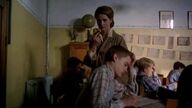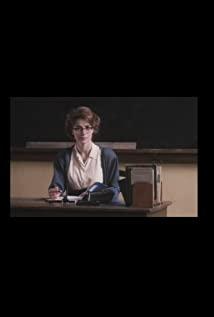Among all human desires, lust is the most difficult to overcome. It is actually the ultimate desire of human beings, the desire for life, and the motive force of birth.
Among all the temptations to people; the temptation of youth and beauty is the most difficult to resist, a more extreme example, like the debilitated professor in "Soul Break in Venice", obsessed with the freshness and beauty of a beautiful boy, this intoxication makes him age faster , died earlier.
The young man who has just grown up is so beautiful, like a brand-new gold coin that has been newly minted; he is always ready to be tempted and tempted. "Farewell to the Classroom" tells such a story: a fifteen-year-old boy Stie had a love affair with a 37-year-old female teacher, Viola. Through this clue, the film tells the process of a boy growing into a man. After all, the female teacher is only a bright color in the background of the teenager's growth, no matter how eye-catching it is, it is only the background.
There is a definition of this love as abnormal love, I don't agree, I don't think this love is much different from other love. There is a shot in the film; a group of students walks from the side corridor; facing the audience's field of vision; the pair of people who are immersed in love comes from the door on the opposite side; the teenager strides in front, and the slender figure. The female teacher followed closely behind her, whispering love words in her lover's ear. That kind of tender and affectionate lingering state was indescribable.
It is said that the female teacher ripened Stie, but I disagree. Who stipulated that in order for a boy to mature, he had to go through a path of similar scenery? The process of growing up is always going to go through some people and some things. In the case of teenage Stie, the series of events in life: love, the sacrifice of his brother, the group of vulnerable adults around him: the female teacher and her frustrated husband, the parents immersed in the loss of their children, all need to be His comfort, these people and events, made the young man begin to mature.
It can only be said that when appreciating literary and artistic works, everyone has a more or less unconscious role, which produces different feelings.
The film is narrated from a man's point of view. The director especially gave a lot of sympathy to the old man: Viola's husband Frank (I suspect that he has the shadow of the director himself): Frank once betrayed his wife, because of his cheating, the new wife was hit and may have a miscarriage, This made him have to endure his wife's infidelity later. The boy he likes is cuckolding him again, and he can't make a difference because of it, and the teenager Stie reminds him of the child he lost. Besides, he is too old to be a little bit more serious, and he only knows how to play, like a lively lamb and calf on the pasture. isn't it? He loves nature and its vibrant products.
This salesman, who is faced with the dual dilemma of business and love life, can only borrow money to worry. There is a scene in the film where the man plays football with the boy. Beside the vigorous teenager Stie, the middle-aged man looked unreasonably weak and old. It is said that the director died two years after the film was made. It is estimated that the director's health may have gone wrong when the film was made. The director cast his current wife as Viola and his son as Stie, and I wouldn't be surprised if the film's plot overlaps in some way with their real family life.
I remember a friend saying that when his son was a baby, he always wanted to touch the stove. At first they stopped him, but the prohibition aroused even greater curiosity in the little guy. After many repetitions, the father lost a little bit. Be patient; he then decides not to stop his son anymore, to watch him touch the stove, let him get a solid burn once, and he should know that the hot stove is untouchable.
I secretly thought that the director asked his beautiful step-wife and his young son to interpret such a story through this film, which was very scheming.
Does he want something to happen between them? If something happened, would he want them to have a happy ending? In the film; when the two are in love with each other, there will always be a wonderful aria that makes this love dream, song and picturesque. . . It was only later that I found out that the song was called "Let My Tears Flow". It was supposed to be an elegy in times of grief, and sensitive audiences could foresee the unfortunate ending.
Human desires are fluid. So adult children must leave their parents' house. In fact, there are elements of avoiding ethical risks.
Teenage Stie thinks he's friends with Viola's men, and they form some kind of alliance. The common enemy of this alliance of men is: Viola the woman. Viola, the name is homophonic with purple, the film borrows Viola's husband's mouth to say: purple is the color of sin. It seems to be saying: All evils originate from women (Chinese expression: "Women are evil waters").
Of course, men are more likely to understand men and tolerate men's weaknesses, but they are less willing to tolerate women's weaknesses. I noticed that Stie unbuttoned or buttoned his pants several times in the film. It made me wonder about the patriarchal ideology implicit in the film. Do female teachers deserve to be hurt? She may not have had any psychological struggles. While temptation goes both ways, romances are clearly initiated by boys—for whatever reason, be it adolescent fantasies, or Oedipus. The temptation of youth and beauty is hard to resist, and Viola has fallen for it and is beyond redemption.
The boy ignited the enthusiasm of the female teacher. Later, he became enlightened and matured. He was about to pass this stage, and he could easily leave. But it is not so easy for female teachers who are deeply mired in emotional quagmire. The film suggests that their romance is largely dominated by the female teacher; she seems to be insatiable, and even spares Stie for the shortest time between breakfast breaks. In addition, she also has a strong desire to control and manipulate. In the beginning, Stie was adored and submissive because she loved her, she asked to turn the music down and Stie turned it down, the teenage boy had already started rebelling against his dad, but not yet against her.
But soon; the female teacher also lost her power to control and manipulate the boy, so the little girl next door had a chance. Obviously; Stie had no interest in little girls; but he had decided to reject the temptation of the female teacher, but he could not restrain the surging sexual desire of the adolescent boy for the time being, and naturally, Stie thought of the girl next door who was interested in him. His first intimate encounter with the little girl (in the pommel box) was after the female teacher suggested a date to him in class. Although compared to the beautiful and slender female teacher, the little girl next door is indeed an ugly little girl, but she can never become a control and manipulator. This is the relationship that men want.
The abandoned Viola also began to numb herself with alcohol like her husband. When she was drunk, she used a broken wine bottle to intimidate the boy to love her. The woman understood that she was hysterical because of the desire to be loved. It is a crazy move under the hopeless inner struggle. At that moment, borrow a comment from a netizen: The sorrow of a woman is magnified to the extreme. Men may understand that she is crazy because she has lost control and manipulation over men.
Not out of fear, but out of pity, the boy comforted her one last time.
How beautiful and graceful the female teacher is at the beginning of the film, and in the second half of the film, after another grief, she becomes ugly and vicious. Look how petulant she shows her garter belt behind the lectern. It's probably not the first time she's done this, and it's no wonder that Stie gets angry and kicks over the desk. It must be said that this kick shows the strength of a man. Although he is only a fifteen-year-old boy, Stie has begun to show signs of a little man.
When I saw this scene, my mind was mixed, and I didn't know whether to be happy for Stie or sad for Viola.
At the end of the film; the boy in the church, this sacred place, unbuttons his trousers to the virtuous female teacher. This action is not only a tit-for-tat for the teacher; let her experience when she unbuttons his skirt at him behind the lectern. The embarrassment and tension he had experienced, probably more wanted to show a fearless spirit, contempt and challenge to all the hypocritical things that seem to be sacred but are actually trying to control and manipulate.
View more about Love Lessons reviews










